FT Magazine
Putin and the monk
By Charles Clover
How much influence does Father Tikhon Shevkunov have over the Russian president?
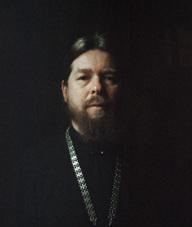
Father Tikhon Shevkunov
Father Tikhon Shevkunov looks a little too polished to fit the image of the Orthodox Christian monk branded into the western imagination by Dostoevsky. The beard is just unkempt enough, but his chin is a bit too sculpted, his mane of shoulder-length hair too full and flowing, and his TV delivery too flawless to belong to any crazed, self-flagellating anchorite from The Brothers Karamazov. Father Tikhon is a picture of movie-star self-assurance – with a passing resemblance to Russell Crowe.
While Dostoevsky’s monks stuck to their unheated monastic cells, Tikhon is no recluse. When I interviewed him in December, he was back from a visit to China and off soon to Latin America. The whitewashed walls and onion domes of Sretensky monastery, which he presides over in downtown Moscow, is not exactly an ecclesiastical island of contemplation, isolated from the modern world.
Read the article in Financial Times: http://www.ft.com/intl/cms/s/2/f2fcba3e-65be-11e2-a3db-00144feab49a.html#axzz2vsBoppjm
Call the monastery, for example, and you will get a switchboard operator. Need to use WiFi? No problem. Walk into an outbuilding and you will see the largest publishing house of the Russian Orthodox church and, since 2000, the best-known and most-used Orthodox website: Pravoslavie.ru.
“At Mount Athos they only just got electricity, and at Sretensky [monastery] the monks all have iPads,” laughs Yevgeny Nikiforov, a friend of Tikhon’s and head of Orthodox radio station Radio Radonezh, referring to the Greek monastery which is the Orthodox religion’s gold standard in terms of cloistered asceticism. “Of course, they need these [iPads] for their proselytsing work,” he says, turning serious when he sees that I am writing this down.
Father Tikhon wields influence in the church far above his modest rank of Archimandrite, or abbot, due primarily to his contacts in the Kremlin. The story that travels with him, which he will neither confirm nor deny, is that he is the confessor to Vladimir Putin. The only details he gives is that Putin, sometime before he became president at the end of 1999 (most likely while he was head of Russia’s FSB security service from 1998 to 1999) appeared at the doors of the monastery one day. Since then, the two men have maintained a very public association, with Tikhon accompanying Putin on foreign and domestic trips, dealing with ecclesiastical problems. But according to persistent rumour, Tikhon ushered the former KGB colonel into the Orthodox faith and became his dukhovnik, or godfather.
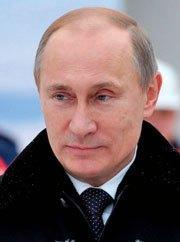
He also would appear to have influence – he has campaigned almost single-handedly for anti-alcohol legislation in Russia, and achieved surprising results: just before the New Year, Russia’s parliament banned alcohol sales after 11pm.
When I press on the real extent of his influence, he is blunt, saying only that he and Putin are well-acquainted, but he refuses to be drawn on the dukhovnik question. “You can believe those rumours if you want, but they certainly aren’t spread by me,” he says. The word “Putin” is nowhere to be found in his autobiography Everyday Saints and Other Stories, which became a publishing sensation in Russia last year – the top-selling book of 2012, beating even the Russian translation of Fifty Shades of Grey.
Whatever the truth of the dukhovnik question, it is something that the Kremlin finds it useful not to deny. “It’s a very private matter,” says Putin’s spokesman Dmitry Peskov, “I simply don’t know,” though he confirmed that Tikhon is “very popular” and the two men do know each other well. “No one for sure would know whether or not he is the dukhovnik. If someone knows you are the dukhovnik, then you are not the dukhovnik any more”.
A former film-school student who was baptised in 1982 at the age of 24, Father Tikhon has thus found himself in the uniquely influential role of other historical churchmen in close proximity to the ear of state power, though he insists, rather credibly, that “I am no Cardinal Richelieu!”
Strictly speaking, he is right, says Yevgeny Nikiforov. “In our confessions there is not very much specific information. You just say ‘I stole’ or ‘I fornicated’. Maybe you add a few specific details like how much and how often. But you don’t need to be very specific. If Father Tikhon is captured by some foreign intelligence service and tortured, there would not be much he could tell them.”
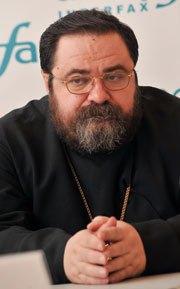
Georgy Mitrofanov of the St Petersburg Theological Academy
Georgy Mitrofanov, a St Petersburg priest, says that the fashion for having a dukhovnik is something that has only recently hit Russia’s elite business and political circles. “It’s an interesting phenomenon, which has happened as rich Russians have started to join the church.
“Most people do not have a personal confessor, it’s something that most people do in crowded churches, like on a conveyor belt. The wealthy want something personal, some see it as a form of psychotherapy,” he says. “However that puts the dukhovnik in a vulnerable position – they become very dependent on their patron.”
Father Mitrofanov doubts that Putin has a real dukhovnik “other than himself”, and says that several years ago he asked Father Tikhon if he was Putin’s confessor, and Tikhon replied that he wasn’t. “However, that was a long time ago and things may have changed,” he says.
. . .
The association between Putin and Father Tikhon is odd for any number of reasons, but the first and foremost is historical. Visitors to the Sretensky monastery may miss the innocuous stone cross unless they are looking for it specifically. It sits in the garden, abutting one of the whitewashed walls, tended by cassocked monks and genuflected over by kerchiefed ladies with the look of salvation on their faces. “In memory of faithful Orthodox Christians, tortured and killed here in the years of turmoil”, reads a bronze plaque set to one side.
Placed in its present spot in 1995, the cross seems to exist in oddly tragic symmetry with the building just a block away at the other end of Bolshaya Lubyanka street – the eponymous headquarters of the former KGB, an organisation which in various incarnations has killed or imprisoned more than 300,000 church workers in the name of official atheism since 1917. During Soviet times the 600-year-old monastery was closed and housed an NKVD (precursor to the KGB) barracks. It is said the premises was even used for executions.
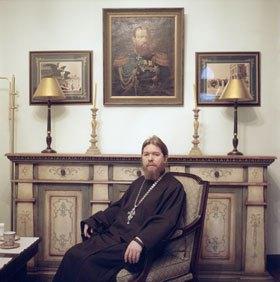
Father Tikhon in a tea room for guests at Sretensky monastery. The painting on the wall is of the Russian tsar Alexander the Third
Today, much has changed. The Lubyanka, which houses the KGB’s successor, the Federal Security Service, now has its own dedicated Orthodox chapel. Sretensky monastery, reopened and renovated, has come to symbolise an awkward alliance of the church and its former persecutors. It has become the center of a spiritual revival among Russia’s ruling circles, who are disproportionately drawn from among the former KGB, and who flooded into the Kremlin 12 years ago on Putin’s coat-tails.
For Father Tikhon, the ravages directed at the church by the institution which to all intents and purposes governs Russia today are not something to dwell on – not a matter for public confrontation – but neither are they something to be specifically hidden away. They are, like the stone cross in his cloister garden, there to be seen only if one is looking for it.
He says he will never be reconciled with the Soviet period of Russian history, but he nonetheless does not consider the crimes of the NKVD or the KGB to be the responsibility of contemporary individuals: “They didn’t have anything to do with that. It would be like blaming some American soldier today for what happened in Vietnam,” he says.
Rather than assigning blame, Father Tikhon seems eager to hammer the 70-year Soviet period into a single arc of historical Russian statehood. All the while they worked for the Soviet state, many of those KGB officers, he says, were in fact serving Russia. “The intelligence officers that I know did what they did on behalf of the Russian state,” he says, “and so to say they were guilty of repressions would be totally false.”
This is, needless to say, something of a minority attitude within the church, especially among the formerly dissident rank-and-file clergy. But it is a view that is nonetheless welcomed and cultivated by the Kremlin leadership, who seem keen to overcompensate for their atheist past, and take advantage of the church’s image. According to a 2010 poll, it is the second most trusted public institution in Russia, despite the fact that only a small minority of Russians attend church regularly. Falling approval ratings and the rise of a street protest movement appear to have accelerated Putin’s efforts to co-opt the church, according to Geraldine Fagan, who monitors religious freedom in Russia and is author of a new book, Believing in Russia.
“Russians identify with the Orthodox church as the only major social institution to have survived their nation’s turbulent history, so Putin wants to capitalise on Orthodoxy’s image of permanence, even as his own legitimacy crumbles,” says Fagan. Sretensky is at the center of this effort: the head of one Moscow public relations firm jokingly calls the monastery “the Kremlin’s department of ideology”. But it is not really a joke.
Once suffused with ideology at every level, Russian political life has for centuries been vulnerable to all-encompassing doctrines and programmes, and many see the kind of muscular, politically tinged orthodox Christianity espoused by Father Tikhon as starting to fill this awkward vacuum left by the disappearance of communism. Father Tikhon denies that he is anyone’s “ideologist”, but the label has begun to stick, especially after 2008, when Tikhon directed and starred in a documentary film and controversial political parable on the collapse of the Byzantine empire, shown three times during prime time on national TV: The Fall of an Empire – the Lesson of Byzantium.
Russian hardliners are fond of the idea that Russia is “The Third Rome” – the inheritor of Byzantium’s fallen Orthodox greatness – and the message of the film does much to reinforce this historical connection, along with justifying in historical terms a profoundly anti-western world view. The Fall of an Empire glosses over the role of the Ottoman Turks, who conquered Constantinople in 1453, and instead argues that Byzantium rotted from within and succumbed to ideological predation by an envious west.
The film charges that rather than sticking to its traditions, Byzantium reformed at the behest of western (Venetian) bankers, portrayed in the film wearing carnival masks with particularly long noses, lest anyone miss the point. The west’s individualistic culture sapped Byzantine resolve and destroyed its hierarchical values. The public lost faith in their rulers.
At the time it was shown, the film raised a scandal among liberals who saw it as eccentric and obscurantist. Today it would barely register on state airwaves dominated by paeans to state authority, historic revisionism, and charges of foreign-financed subversion directed at Kremlin opponents. Tikhon, in other words, was a bit ahead of his time – but now has trouble getting noticed in the midst of a wholesale swerve of the political elite towards conservative nationalism and xenophobia following Putin’s return to a third term as Russia’s president last May.
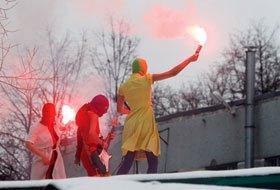
Pussy Riot, later found guilty of ‘hooliganism motivated by religious hatred’, in 2011
A secular state according to its 1993 constitution, Russia recently flirted precariously with religious law in last year’s strange prosecution of punk band Pussy Riot, which transformed them into global martyrs after they were given two-year prison sentences (one has since been set free), guilty of “hooliganism motivated by religious hatred”.
Prosecution documents state that the laws broken by the three defendants – who performed “Blessed Virgin, throw Putin Out!” wearing Day-Glo balaclavas in Moscow’s Christ the Saviour cathedral – were articles 62 and 75 of the Quinisext Council, held under the emperor Justinian in the seventh century. According to these articles, access to the solea and pulpit of Orthodox churches is reserved for clergy. While the final sentence by the judge in the case dropped references to the Quinisext Council, it did cite as expert opinion the fourth-century Council of Laodicea, according to which: “The solea and ambon have special religious significance for believers.”
Many in the church think the state may have overstepped the mark in its zeal to cover itself in the mantle of church legitimacy, and the scandal opened a row between high-ranking church dignitaries, such as Patriarch Kirill, and the formerly dissident clergy, many of whom seek reforms. “These medieval canons have nothing to do with state law,” says Father Mitrofanov. “They simply used the church as ‘ideological cover’ in the same way a Soviet court would use communist ideology to justify a decision.”
Father Innokenty Pavlov, who retired from the church in 1993 and is a noted liberal opponent of the Orthodox establishment, says he doubts there is anything aside from political expediency behind the newly religious attitude of Russia’s rulers.
“It seems our leaders learnt one useful thing from their scientific atheism classes,” he laughs: “Voltaire said ‘if there were no God it would be necessary to invent him’. They thought, what a good idea, let’s implement this.”
Even Father Tikhon signed a petition calling for reducing the sentences. He is harshly critical of Pussy Riot’s behaviour, saying: “The state must react to this, or else it is not a state”, and “If they did this in Westminster Abbey, they would have got a prison sentence for sure.” Yet he adds, “but two years is too much”.
Perhaps as a result of overdoing his hardliner image, Father Tikhon has of late been anxious to emphasize his softer side. He raises funds for the monastery’s children’s center that cares for about 100 handicapped children, which is financed jointly by the monastery and the state.
“If you are looking for a ‘symphony’ of church-state power – this is it,” he says, using the fifth-century Byzantine term for theocratic rule. “This is an example of the church and the state working together for good.”
If Father Tikhon has indeed gone soft, there is no better evidence than his recent autobiography Everyday Saints and Other Stories. It is devoted mainly to reminiscences of an older generation of churchmen, Tikhon’s teachers, who he presents through a rather gauzy, nostalgia-laden portrait of a time when life was simpler. Unlike his earlier film project, there is no overt chest-thumping nationalism or pro-regime political propaganda, only a rather well-written and compelling narrative about the lives of monks in the Soviet Union.
It was actually a particularly harrowing experience with a Ouija board in 1982 that started Father Tikhon – still in film school at the time and named Georgy Shevkunov – on his long road to the heights of secular and spiritual power in Russia. The decision to be baptised was not taken lightly back in the days of the pre-perestroika Soviet Union. But Shevkunov had a pretty compelling reason.
An amateur spiritualist, he and a group of friends had taken an interest in the occult, finding that, with the help of a few candles, a planchette and the right attitude, they could “establish contact with certain completely incomprehensible but nonetheless absolutely real entities” from the spirit world, according to his autobiography. The new acquaintances introduced themselves variously as Napoleon, Socrates and even Stalin. It was fun for a while. And then, it almost went horribly wrong.
One evening, the group managed to contact who they believed was 19th-century author Nikolai Gogol. But he was in a terrible mood, and the group recoiled in terror when, in a fit of extreme crankiness, Gogol told them all to commit suicide by ingesting poison. They raced from the room, and the next day, headed straight to the nearest church, where a priest chastised them. The foolish youngsters had not really been in contact with Gogol, said the priest. Instead, they had simply been the victims of a clever prank. By a minor demon, most likely. His recommendation: baptism.
Tikhon’s generation were spiritual explorers, which drew many like him to Christianity. The Soviet prohibition on religion only made it more attractive – the forbidden fruit. Yevgeny Nikiforov, who is in his fifties, laughs today when he remembers the antics of his 1980s generation.
“First we all learnt yoga, then we studied Sanskrit, then we read the New Testament. It was all the same to us at the time. Only later did we become spiritually mature,” he says. “No one had the first clue. The KGB even thought karate was a religion,” he laughs. “We watched Bruce Lee movies thinking they were some sort of mystical experience. Can you imagine?”
Father Tikhon says what drew him to Christianity (aside from an attempt to avoid demonic possession) was that it became obvious to his generation that “all the great figures of the world and Russian history” – he mentions Dostoevsky, Tolstoy, Kant, Goethe and Newton, among others – “all those whom we trusted and loved and respected, all of them had thought about God in a completely different way from us.” On the other hand, “those who evoked no sympathy whatsoever” – Marx, Lenin, Trotsky – “all these destructive revolutionaries who led our state to what it had become, all were atheists.” The choice, he says, was clear.
Soon after baptism, Shevkunov took up residence in Pskov Caves monastery, an onion-domed former hermitage in Russia’s northeast, one of only two functioning male monasteries that remained by the 1980s of the nearly 1,000 which had existed before the 1917 revolution. In 1991, he took his monastic vows, taking the name Tikhon, and became the Archimandrite of the Sretensky monastery in 1995.
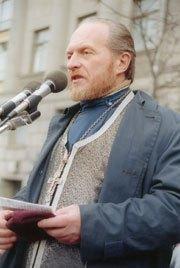
Father Gleb Yakunin at a political meeting in 1990
Tikhon’s autobiography is mainly devoted to those “everyday saints” whom he calls his teachers, who endured far more than he did at the hands of the Soviet regime. Father Tikhon’s own dukhovnik Father John Krestiankin, the late Archimandrite of the Pskov Caves monastery, had his fingers broken during interrogation by the NKVD shortly before being sent off to Gulag for five years in 1950.
“Thank God, I did not have the same serious conflicts which my predecessors had,” Tikhon says today. “In the 1980s, we did not have such repressions, they could ruin your professional life, ban you from studying, or from having prestigious work, but no more than that.”
But while occasionally something akin to anger shows through in the prose, Everyday Saints is written in a mellow and forgiving spirit, mainly devoted to personal reminiscences of the quirks and loveable foibles of an older generation of churchmen. Critics say the book is notable for what it leaves out: that in addition to clashes with authorities, the clergy often compromised. Many level the accusation that church dignitaries worked for the KGB, which essentially controlled the levers of promotion within the church through the end of the 1980s.
No one knows more about this painful episode of the church’s history – the co-operation between top-level clergy and the KGB – than Father Gleb Yakunin, a former priest and liberal reformer who was excommunicated in 1997 partly for his criticism of the church. On the subject of the uncanny success of Tikhon’s new book, Yakunin admits he and his wife both liked Everyday Saints. But he says it represents “half the story” – the positive half – and dismisses it as “Socialist realism” (a reference to the Soviet school of official art devoted exclusively to painting happy factory workers and peasants).
Yakunin himself spent five years in a prison in the 1980s. Then, in 1992, under pressure from then President Boris Yeltsin, Yakunin was granted access to the archives of the KGB’s fifth directorate, fourth department, which dealt with religious groups, and spent a month going through the agent reports. While he was never given the card file with the identities of the agents, he was able to glean from the patterns of their reports who they were by comparing their codenames with information on the activities of top-level clergy.
For instance, he found an intriguing travel itinerary of agent Mikhailov, who, according to his reports, traveled to New Zealand and Australia in February 1972 and then to Thailand in January 1973 for meetings of the World Council of Churches.
Cross-checking these with news entries in the Journal of the Moscow Patriarchate, Yakunin found that a certain Archimandrite Kirill, who worked in the church’s department of external relations, took such a trip on those dates. In 2009, after four decades of rising though the ranks, the white-bearded, portly Kirill was named patriarch of the Russian church. The church maintains that Kirill was never an employee or agent of the KGB. Representatives of the patriarch declined to comment further.
According to Father Yakunin, the church was so thoroughly infiltrated by the KGB that “virtually the entire episcopate were recruited as informers”. There is no evidence that Father Tikhon was himself compromised by association with the KGB – he would have been too young to make an attractive target for recruitment. However, people he writes about were – for example, in the mid 1980s he spent two years as assistant to Father Pitirim, the head of the publications department of the church, who Father Yakunin refers to by his alleged KGB codename “Abbot”.
“I respect Father Pitirim and wouldn’t want to throw any stones at him” says Father Tikhon, a bit obliquely, on this subject.
Twenty years later, compromises made under the Soviet regime are still the subject of a painful debate within the church. Instead of purging the former collaborators, it is those who have raised the issue, like Father Yakunin, who have been purged.
“The Russian church created Russia,” says Father Tikhon. “Russia can sometimes be an obedient child, and sometimes a child that revolts against its parents. But the church always has felt responsibility for Russia.”
Charles Clover is the FT’s Moscow bureau chief.
Copyright The Financial Times Limited 2014. You may share using our article tools. Please don’t cut articles from FT.com and redistribute by email or post to the web.
NY Times – Everyday saints
New York Times interview with Archimandrite Tikhon (Shevkunov)
Sophia Kishkovsky
Russians See Church and State Come Closer
As the Russian Orthodox Church continues its ascent as a political force, Archimandrite Tikhon Shevkunov stands at the center of a swirling argument about the church’s power and its possible influence on President Vladimir V. Putin.
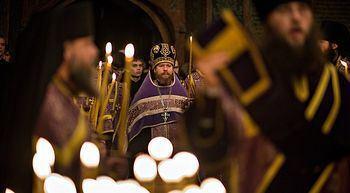
Father Tikhon, a former film student, presides over the 14th century Sretensky Monastery here, near the headquarters of the former KGB, for which Mr. Putin worked in Soviet times. A media-savvy figure, Father Tikhon has written a surprise best seller about monastic life and has been described as “Putin’s spiritual father” — a label he coyly neither embraces nor denies.
“It would be cruel of me to answer this question, to say yes or no and take away the bread of journalists,” he said recently in an interview in his receiving room, adorned with portraits of a saint and a czar. “Although, of course, one doesn’t answer such a question about anyone,” he added.
This week, Father Tikhon was in the news again after reports, swiftly denied, that the police had shut down a brothel on the grounds of his monastery. He branded the story “unconscionable slander” and “a vivid example of the information war against the church.” The truth, he told the news agency RIA Novosti, was that a brothel had been operating in a building next to cloister grounds, and that his monastery had demanded it be shut.
Father Tikhon, 54, took over at the white-walled monastery, one of Russia’s oldest, in 1995. He has since transformed the structure, which served as a killing ground in Stalin’s times, into a cinematically perfect vision of Orthodoxy.
A few days later, on an idyllic fall evening, his black monastic robes billowed in the wind as choral music wafted through the air and a crush of bescarved women lunged for his blessing.
Some critics belittle Father Tikhon as a publicity hound. But others, who see him as a rising power broker, call him a promoter of a rigid Orthodox fundamentalism. That is a charge he dismissed as “nonsense.”
The old debate over the role of the Orthodox Church and its relationship to the state broke into the open most recently over the conviction of members of the punk band Pussy Riot for staging an anti-Putin stunt at Moscow’s biggest cathedral. The performance, which was captured on a video that circulated widely on the Internet, mocked both Mr. Putin and Patriarch Kirill I, the head of the Orthodox Church.
In this atmosphere, Father Tikhon’s ties to Mr. Putin have come under scrutiny. He had already attracted attention in 2008, for writing and narrating a television documentary that depicted the fall of Byzantium as a parable about the threats to modern Russia. The film was derided by liberals as pandering to Mr. Putin’s worldview of a virtuous Russia under threat from foreign forces.
Now as the author of “Unsaintly Saints and Other Stories,” a book about monastic life and the path to faith, Father Tikhon and his Kremlin connection are even more prominent. The book focuses on another famous monastery that Mr. Putin visited shortly after becoming president in 2000.
One unanswered question is whether Father Tikhon is, in fact, Mr. Putin’s spiritual father — in Russian Orthodox tradition, a figure who is a father confessor and guide to salvation.
“I know Archimandrite Tikhon personally, and he told me directly that he is not Putin’s spiritual father,” Father Georgy Mitrofanov, a prominent St. Petersburg priest, said publicly in September. “I think that our president’s main spiritual father is he himself.”
When pressed on the question, Father Tikhon changed the subject to the Chinese winter watermelon grown on the farm run by his monastery.
For all the reticence, Father Tikhon is an unabashed supporter of Mr. Putin, saying he saved Russia from “vulgar liberals” who nearly destroyed it in the 1990s. During the interview, he checked the time to make sure he would not be late to a Kremlin meeting of Mr. Putin’s culture commission.
At the meeting, according to the Kremlin Web site, Mr. Putin chided the monk, who is a member of the commission, for comparing today’s young Russian women to “a drunk girl standing by the bus stop.”
“Father, you have gone too far,” Mr. Putin reportedly said.
In 2007, Mr. Putin and Father Tikhon were instrumental in the reunification of the Russian Orthodox Church and the Russian Orthodox Church Outside of Russia, which is based in New York. The reunification is a centerpiece of Mr. Putin’s efforts to stitch together the red and white in Russian history — the Soviet and the czarist pasts.
To mark the fifth anniversary of that reunification and to promote an English translation of his book, titled “Everyday Saints,” Father Tikhon toured the United States in October with the Sretensky Monastery Choir.
Fr. Tikhon’s book runs 640 pages and has sold over 1.1 million copies in Russian. Millions more have been downloaded electronically. OLMA Media Group, which published the book in 2011, announced in August that it was the country’s biggest best seller since the Soviet era. The profits are going back into the Sretensky Monastery, Father Tikhon said, to build a cathedral honoring those killed there for their religious faith in Soviet times.
The book is a portrait of one of the Orthodox Church’s holiest sites, the Pskovo-Pechersky Monastery in northwestern Russia. The monastery stayed open during the Soviet era, surviving first within independent Estonia, then by the wiliness and fortitude of the monks after the territory was absorbed into the Soviet Union.
Georgy Shevkunov, as Father Tikhon was known before taking his vows, became a novice there shortly after his baptism in 1982, a sharp turn from studies at the Soviet Union’s most prestigious film school. At the monastery, he writes, “a new world had suddenly opened up, incomparable in its beauty.”
Mr. Putin visited the monastery in August 2000. Russian church Web sites say that he spent over an hour in private conversation with Archimandrite Ioann Krestyankin, a revered monk who died in 2006 and who served as spiritual guide to Father Tikhon.
In the monastery’s guest book, Mr. Putin wrote: “The revival of Russia and growth of its might are unthinkable without the strengthening of society’s moral foundations. The role and significance of the Russian Orthodox Church are huge. May God protect you.”

